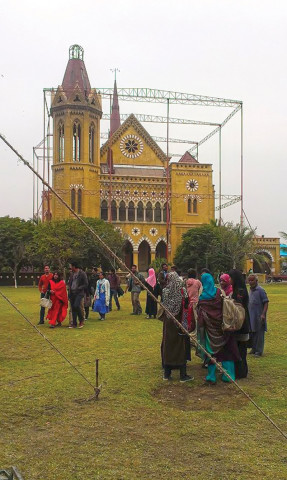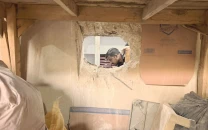Making use of Frere Hall will help revitalise it
Students of the Indus Valley School of Arts and Architecture suggest ways to promote the use of Frere Hall.

Students of the Indus Valley School of Arts and Architecture suggest ways to promote the use of Frere Hall. PHOTO: FILE
Unfortunately, Karachi is increasingly being divided along ethnic, religious and socio-economic lines that often get defined with manifestations that are physical, such as the ‘gated community’ syndrome. All this gives Karachi a ‘non-inclusive’ character that goes against the grain of a ‘sustainable’ and ‘livable’ city.
Promoting inclusiveness and cohesiveness are now considered absolutely vital to the design and management of a ‘smart’ and ‘sustainable’ city. Within this new thinking and philosophy for designing public spaces, the aim is to create a place that has the capacity to build the social capital.
Placemaking
In 2011, the UN-Habitat and Project for Public Spaces (PPS) - a not-for-profit organisation based in the United States, signed a cooperative agreement, ‘Transforming Cities through Placemaking and Public Spaces’, to utilise the power of public space in enhancing safety and security, creating economic opportunity and building democracy.
Placemaking creates spaces with attractions for all age and socio-economic groups. Building partnerships with public and private organisations, and civil society groups is an integral part of this approach. This creates a participatory approach and multiple types of ‘stakes’ that make sure the project is sustainable. Such spaces need to be accessible, people must be able to engage in diverse activities, be comfortable and have a good image, and they must be sociable places.
Experiment: Frere Hall
The historical landmark, Frere Hall, can be an ideal place to experiment ‘placemaking’. For quite some time, this space was inaccessible to the residents due to security reasons. But, more recently, the Frere Hall premises hosted a three-day international conference on urban development and sustainability issues in South Asian cities.
This could have been a major breakthrough in reviving Frere Hall but the magnificent structure served only as a backdrop as academics and urban planners shared the limelight. The way the planning and design of the recently held London Olympics - where the event helped revitalise the blighted sections of London, such as the East End area - could have been experimented with here.
However, revitalisation following the approach of placemaking can still be done and was taken up by a group of fourth-year, architecture students of the Indus Valley School of Arts and Architecture. The students suggested a mix of dynamic and static approaches in which some activities will be permanent, such as setting up an art gallery and a library, or developing a food street, while others were more flexible, such as holding book fairs, flowers shows, cultural events, learning classes for performing arts, student tours and workshops, conferences and public events, open-air theatre and cinema, play areas. One of the suggestions also included having a fireworks day every month.
Some students suggested creating pathways to promote walking and bicycling in the garden area, setting up picnic tables and barbeque spots. Landscaping exciting contours in the surrounding green spaces, creating water bodies and placing sculptures were also suggested. The students also proposed using solar panels on the canopies in the seating spaces and the food street so that the space is able to generate energy for itself.
While the city government will have to take the lead, this exciting project can also result from collaboration between the private sector, civil society groups and specialised entities, such as performing arts institutions, universities, etc.
The writer is an urban planner and runs a non-profit organisation based in Karachi city focusing on urban sustainability issues. He can be reached at fanwar@sustainableinitiatives.org.pk
The Placemaking Team
The ideas shared by the Placemaking team at IVS include the following fourth-year students of architecture: Insia Abbas Lakda, Takreem Nehal, Rija Yousuf, Jahangir Ahmed Chohan, Furrukh Ahmed Salman, Faheem Abrar, Samar Zehra, Ayesha Channa, Mehreen Kazim, Rushad Dastoor, Kazim Naqvi.
Published in The Express Tribune, March 31st, 2014.



















COMMENTS
Comments are moderated and generally will be posted if they are on-topic and not abusive.
For more information, please see our Comments FAQ